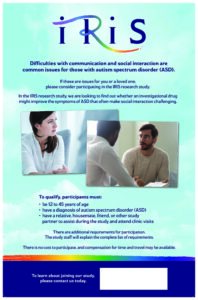A study of an investigational medication for social communication deficits in Autism Spectrum Disorders
What's the study about?
This study is randomized, double-blind, placebo-controlled, which means that it meets the highest level of scientific integrity. The study will enroll approximately 150 adolescent and adult participants with ASD. The primary objective is to understand if this medicine can improve social communication in individuals with autism spectrum disorder.
Who can participate?
Inclusion Criteria:
- Age 12 to 45 at screening
- Has a designated care/study partner who can reliably report on symptoms
- Has a diagnosis of Autism Spectrum Disorder (ASD)
- Has a body mass index (BMI) 18 through 34 kg/m², inclusive
- Full scale IQ (or equivalent) ≥55 score
- Psychoactive medications and adjunctive therapies are stable for 4 weeks prior to screening
- Must be able to swallow study medication
Exclusion criteria:
- Has Rett syndrome or Child Disintegrative Disorder
- Has participated in any other study and received any other investigational medication (other than COVID-19 vaccination) or device within 60 days prior to screening
- History of epilepsy without current adequate control, or any seizure in the 6 months preceding screening
- History of suicidal ideation or behavior in the past 12 months, or a positive response to the C-SSRS
- If female, is pregnant or lactating
What will participants be doing?
The study will last for approximately 143 days and will include 10 in-person visits and 1 final phone call.
The study assessments will include:
- Questionnaires
- Medical History
- Physical exams
- Vital signs
- Blood and urine tests
- Electrocardiogram
- Eye tracking videos
You will take the investigational medicine or placebo every day. You will not know which one you are taking. Each visit will take a few hours. Your travel to visits, meals during some visits, and time for attending visits may be compensated.
Why is this important?
Social communication deficits are a core ASD symptom that have a major impact on a patient’s quality of life. There are no approved treatments for this condition. Although two medicines are approved for irritability in ASD, neither is effective for improving ASD social deficits and both are associated with side effects that limit their use in this population. Therefore, medicines that are safe and effective to treat social deficits are urgently needed.
The investigational medication activates a receptor in the brain that is thought to be associated with sociability (social behavior). This study will investigate the safety and effectiveness of the investigational medication as a potential new therapy for patients who have no other treatment options available to them.

